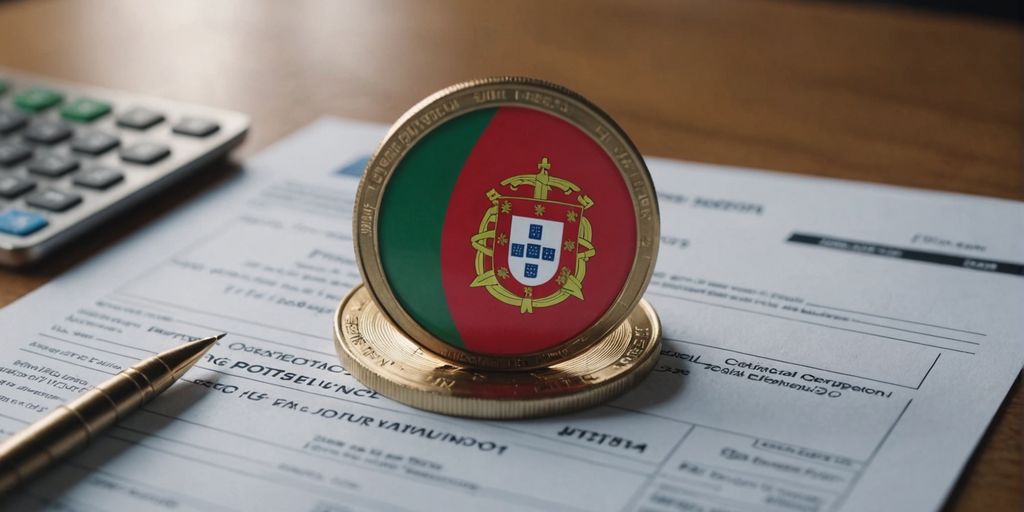This article is for information only, and does not constitute advice on taxation or cryptocurrency investing and you should consult an authorized tax professional for any taxation advice.
Cryptocurrency rules and taxation in Portugal have seen some significant changes by July 2024. Portugal was once known as a crypto tax haven, but recent updates have brought more clarity and structure to how crypto is taxed. This article could help you understand these changes and what they mean for crypto investors and traders in Portugal.
Considerations
- Portugal used to be a crypto tax haven but has introduced new taxes on cryptocurrency transactions.
- Tax residency in Portugal affects how your crypto income is taxed.
- Different types of crypto income, like capital gains and mining, are taxed differently.
- There are specific reporting requirements for crypto holders, and penalties for not complying.
- Consulting a tax professional can help you navigate these complex rules.
Overview of Cryptocurrency Taxation in Portugal
Cryptocurrency taxation in Portugal has evolved significantly over the years. Initially, the country was known for its lenient stance on crypto taxes, attracting many investors and traders. However, recent changes have introduced more structured regulations.
Historical Context of Crypto Taxation
Portugal’s early approach to cryptocurrency was relatively relaxed, with minimal tax obligations for crypto holders. This leniency made Portugal a popular destination for crypto enthusiasts. Over time, as the market grew and matured, the government recognized the need for more comprehensive tax rules.
Recent Changes in Crypto Tax Laws
In recent years, Portugal has implemented several changes to its cryptocurrency tax laws. These updates aim to provide clarity and ensure fair taxation. The new regulations categorize crypto income into different types, each with specific tax rates and reporting requirements. Staying informed about these changes is crucial for compliance and effective tax planning.
Tax Residency and Its Implications
Determining your tax residency in Portugal is essential for understanding how your cryptocurrency transactions will be taxed. Tax residency status affects whether you are taxed on your worldwide income or just the income earned within Portugal.
Determining Tax Residency
To determine if you are a tax resident in Portugal, you need to consider several factors. These include the location of your permanent home, where your family resides, and the number of days you spend in Portugal during the tax year. Generally, if you spend more than 183 days in Portugal in a year, you are considered a tax resident.
Impact on Crypto Taxation
Your tax residency status has significant implications for how your cryptocurrency income is taxed. If you are a tax resident, you will be taxed on your worldwide crypto income. Non-residents, however, are only taxed on the income earned within Portugal. This distinction is crucial for digital nomads and expatriates who may have income from multiple countries.
To navigate these rules effectively, it is advisable to keep detailed records of all your transactions and consult with a tax professional to ensure compliance with Portuguese tax laws.
Categories of Taxable Crypto Income
In Portugal, income from cryptocurrency can be classified into several categories, each with its own tax implications. Understanding these categories is crucial for compliance and effective tax planning.
Capital Gains Tax
Capital gains from cryptocurrency transactions are taxed under PIT Category G. This includes profits made from selling or exchanging crypto assets. The tax is applied at the moment of disposal, meaning when you sell or trade your crypto for another asset or fiat currency.
Income from Mining and Staking
Earnings from mining and staking activities fall under PIT Category B. This category covers income from issuing crypto assets, validating transactions, and other similar activities. The tax rates for this category are progressive, ranging from 14.5% to 53%.
Business Income from Crypto Activities
If you engage in crypto trading or other related activities as a business, your income will also be classified under PIT Category B. This includes any professional income derived from crypto activities, which is subject to the same progressive tax rates as mining and staking income.
Tax Rates for Cryptocurrency Transactions
In Portugal, the tax rates for cryptocurrency transactions depend on how long you hold the assets and the type of income they generate. For crypto assets held for less than 365 days, a flat tax rate of 28% is applied to the capital gains realized. However, investors have the option to include these gains in their general taxable income, which can then be taxed at progressive rates ranging from 14.5% to 53%, depending on the total income. Crypto held for more than 365 days is reportable but not taxed, with exceptions for certain conditions.
Short-term vs Long-term Gains
Short-term gains, or those realized within 365 days of acquiring the cryptocurrency, are subject to a flat 28% tax rate. This is a significant consideration for traders who frequently buy and sell crypto assets. On the other hand, long-term gains, or those from assets held for more than 365 days, are generally not taxed, making long-term holding a potentially tax-efficient strategy.
Applicable Tax Rates for Different Income Types
The tax rates also vary based on the type of income generated from cryptocurrency activities:
- Capital Gains Tax: As mentioned, short-term gains are taxed at 28%, while long-term gains are usually not taxed.
- Income from Mining and Staking: Income from mining is taxed at 0.95%, while other transactions with crypto-assets are taxed at 0.15%. This income is also subject to the standard Personal Income Tax (PIT) rates, which range from 14.5% to 48%. An additional charge applies to taxable income exceeding EUR 80,000, with a rate of 2.5% for income from EUR 80,000-250,000 and 5% for income exceeding EUR 250,000.
- Business Income from Crypto Activities: If you earn income from business activities related to cryptocurrency, such as running a crypto exchange or providing advisory services, this income is taxed according to the standard business tax rates in Portugal.
Understanding these tax rates is crucial for crypto traders and investors to manage their tax liabilities effectively. Always consider consulting a tax professional to navigate these complexities and ensure compliance with the latest regulations.
Reporting Obligations for Crypto Holders
As a taxpayer in Portugal, you must comply with specific reporting obligations for crypto taxes. Every year, you need to file a tax return (Modelo 3 de IRS) for income earned in the previous year. This includes income from crypto-asset transactions. You must disclose the type of transaction, type of income, amounts, and dates.
Annual Reporting Requirements
Filing your IRS declaration is a must for many taxpayers. If you earned income in 2023, you need to submit your declaration between April 1st and June 30th. This includes all income types, such as wages, business income, and crypto earnings. Make sure to provide accurate details to avoid issues.
Penalties for Non-compliance
Failing to meet these reporting obligations can lead to penalties. The Portuguese Tax Authorities may impose fines or other sanctions if you do not file your tax return or if the information provided is incorrect. It’s crucial to stay informed and comply with all requirements to avoid these penalties.
Tax-saving Strategies for Crypto Investors
To effectively minimize your cryptocurrency taxes in Portugal, adopting strategic approaches can lead to significant savings on your tax bill. Here are a couple of tips:
Comparative Analysis with Other EU Countries
When comparing Portugal’s cryptocurrency taxation with other EU countries, several differences and similarities emerge. Each country has its own approach to taxing digital assets, influenced by local laws and economic policies. This section will explore how Germany, France, and the Netherlands handle crypto taxation.
Crypto Taxation in Germany
Germany treats cryptocurrencies as private money, not as legal tender. This means that capital gains from crypto held for over a year are tax-free. However, if sold within a year, gains are taxed at the individual’s income tax rate. Mining and staking are considered commercial activities and are taxed accordingly.
Crypto Taxation in France
France has a more stringent approach. Cryptocurrency transactions are subject to capital gains tax. The rate can be as high as 30%, depending on the amount of profit. Mining and staking income is also taxable, often at higher rates due to its classification as commercial income.
Crypto Taxation in the Netherlands
The Netherlands views cryptocurrencies as assets. They are subject to a wealth tax rather than a capital gains tax. The tax is based on the value of the assets on January 1st of each year. Income from mining and staking is considered business income and taxed at the applicable rates.
By exploring the current landscape of Portugal politics post-2024 elections, focusing on digital asset hub status, golden visa program, and international investment strategies amidst a fragmented parliament and evolving economic policies, one can better understand the unique position Portugal holds in the EU regarding crypto taxation.
Impact on Digital Nomads and Expatriates
Portugal has become a popular destination for digital nomads and expatriates due to its favorable tax policies and high quality of life. However, Portugal’s digital nomad dream faces reality check. Rising local resistance, administrative hurdles, and policy changes challenge the allure of Portugal for digital nomads.
Future Trends in Crypto Taxation
As cryptocurrencies continue to gain popularity and adoption worldwide, investors and traders need to understand the tax implications of their crypto activities. In Portugal, crypto taxes have undergone significant changes in recent years, making it crucial for individuals to stay informed and compliant with the latest regulations. This comprehensive guide will provide all the necessary information about crypto taxes in Portugal for 2024. From the tax rates and categories to reporting obligations and tips.
Despite these changes, cryptocurrency trading continues to be permitted without specific prohibitions. However, it’s crucial for investors and residents to grasp how these adjustments impact their tax responsibilities, especially for those who have previously enjoyed the benefits of tax-exempt crypto earnings.
By implementing these strategies and staying informed about the latest tax regulations, you can effectively minimize your crypto tax liability in Portugal.
Navigating the world of crypto taxes can be complex, but it’s crucial to stay informed and compliant with the regulations in your jurisdiction. In Portugal, cryptocurrencies are now subject to taxation, with different tax rates depending on the income category. By understanding the tax rates and reporting obligations and implementing tax-saving strategies, you can effectively manage your crypto tax liability in Portugal. Remember to consult a tax professional for personalized advice tailored to your.
For years, Portugal has held the allure of limited taxation on crypto, attracting digital asset enthusiasts with its sunshine and seemingly lax regulations. However, that era has largely transitioned into a period of measured taxation, with new rules implemented in 2023.
Portuguese tax residents pay tax on world-wide income, which includes world-wide crypto related income. Crypto taxation for individuals typically falls within one of the following three categories:
Common Challenges in Crypto Tax Compliance
Navigating the world of crypto taxes can be tricky, especially when it comes to staying compliant. One of the biggest challenges of cryptocurrency taxation is compliance. Many cryptocurrency investors are unaware of their tax obligations, while others may be confused by the rules. Here are some common issues that crypto holders face:
Record-Keeping Issues
Keeping accurate records of all crypto transactions is essential but can be difficult. Every trade, purchase, or sale needs to be documented. Without proper records, calculating gains and losses becomes nearly impossible.
Valuation of Crypto Assets
Determining the value of your crypto assets at the time of each transaction is another challenge. The value of cryptocurrencies can fluctuate wildly, making it hard to pinpoint the exact worth at any given moment.
Dealing with Multiple Exchanges
Many investors use multiple exchanges to trade cryptocurrencies. This can complicate the process of tracking transactions and ensuring all trades are reported correctly. Each exchange may have different reporting standards, adding to the confusion.
Frequently Asked Questions
What are the new cryptocurrency tax rules in Portugal as of July 2024?
As of July 2024, Portugal has specific taxes on cryptocurrency transactions. These rules apply to all residents, including those with Non-Habitual Resident status.
How do I determine my tax residency in Portugal?
You are considered a tax resident in Portugal if you spend more than 183 days in the country within a year or have a permanent home here.
What types of crypto income are taxable in Portugal?
In Portugal, taxable crypto income includes capital gains, income from mining and staking, and business income from crypto activities.
What are the tax rates for short-term and long-term crypto gains?
Short-term gains are taxed at a higher rate compared to long-term gains. The exact rates can vary, so it’s best to consult the latest guidelines or a tax professional.
What are the reporting obligations for crypto holders in Portugal?
Crypto holders must report their holdings annually. Failure to do so can result in penalties.
Are there any tax-saving strategies for crypto investors in Portugal?
Yes, investors can utilize tax deductions, time their transactions wisely, and consult tax professionals to minimize their tax liability.
How does Portugal’s crypto taxation compare to other EU countries?
Portugal’s crypto tax laws are relatively favorable compared to countries like Germany, France, and the Netherlands, but they have become stricter since 2023.
What challenges might I face in complying with crypto tax laws in Portugal?
Common challenges include keeping accurate records, valuing crypto assets, and dealing with multiple exchanges. Consulting a tax professional can help navigate these issues.













